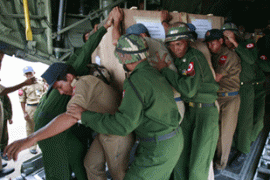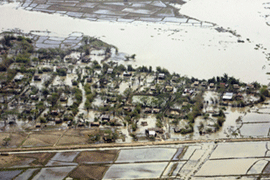Myanmar red tape blocks relief work
Many agencies still unable to enter country, citing military government’s foot dragging.

The United Nations says a million people may have been displaced and the situation on the ground is desperate, with survivors sleeping where they can and running out of food and water.
In depth: Myanmar cyclone

 |
Relief work hampered by red tape
Map: The deadly path of Cyclone Nargis
Satellite photos: Before and after the cyclone
Timeline: Asia’s deadliest storms
The military government has been criticised for responding slowly, before and after the cyclone struck.
Meteorologists say they gave 48 hours warning before the storm hit, but people were not told early enough to evacuate.
A spokesman for the UN’s World Food Programme said on Tuesday it had begun distributing food in damaged areas of the former capital Yangon and that 800 tonnes of food had already arrived.
But many others aid providers were still waiting for visas to allow their teams entry into Myanmar, including a five-person UN disaster assessment team waiting to go in from Bangkok.
Aid abuse fears
Two US navy ships are waiting near the waters of Myanmar for its green light to carry out evacuation and other critical relief activities.
“We’re prepared to move US navy assets to help find those who have lost their lives, to help find the missing, to help stabilise the situation,”
George Bush, the US president, said.
| Your Views |
|
Should Myanmar postpone the referendum in light of Cyclone Nargis? |
“But in order to do so, the military junta must allow our disaster assessment teams into the country.”
Some refugees from Myanmar have criticised Bush for setting conditions on aid in their country’s hour of need.
But others are pushing for caution, saying they do not want humanitarian assistance to end up enriching the generals who run the country.
They have warned that aid may be funnelled off to the military if it is not distributed directly to the people who need it.
Bush Gulati, with the Committee for the Restoration of Democracy in Burma, said “if any aid goes in the hands of the government, even if it’s a blanket, the army will use it for themselves”.
 |
| Logistical problems are also hampering aid to the isolated Irrawaddy delta [Reuters] |
Countries such as France have also expressed concerns over how the relief will be distributed.
It seems clear the military rulers in the secretive country are trying to control the situation.
Rashid Khalikov, director of the Geneva-based UN Office for the Co-ordination of Humanitarian Affairs, said that efforts to assist hundreds of thousands of people in need of help were being hampered by the government’s inexperience and red tape such as the need for visas.
The scale of the devastation is also posing logistical problems for relief teams, with communications and transport severely affected.
The worst-hit Irrawaddy delta remained largely cut off from the rest of the world four days after winds, floods and high tidal waves tore through the densely populated region.
Despite all that, governments and aid agencies have already pledged more than $10m in aid with the European Commission and the US contributing $3m each.
Walter Lohman, a South-East Asian expert at the Washington-based Heritage Foundation, said Myanmar‘s military rulers now face a difficult decision because of years of isolation from the rest of the world.
“The generals have a choice to make between helping the Burmese people – who are in dire need of help – or out of fear of losing their total grip on power and spoils, effectively turning away international assistance,” he said.